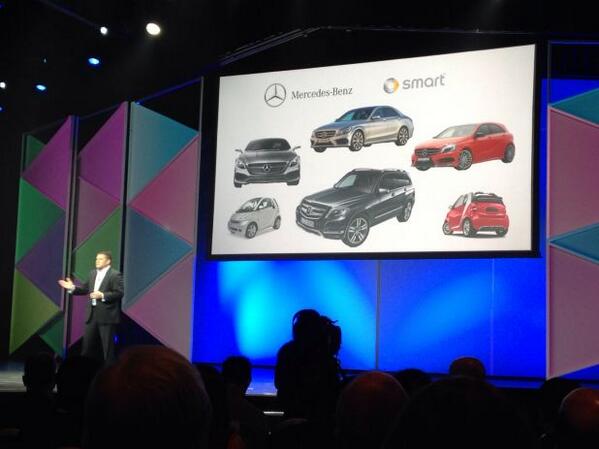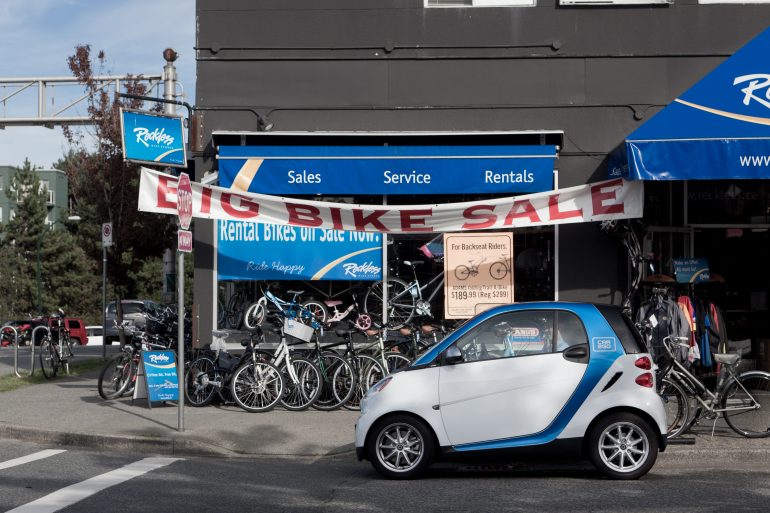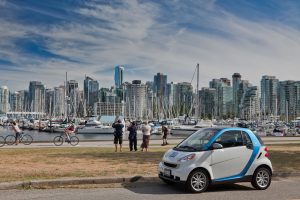If you call Vancouver, Calgary, Toronto, or Montreal home you’ve most likely seen Car2Go’s Smart “fortwo” vehicles parked or on the move. The service’s North American debut was in Austin, TX (March 2010), and followed launching in Vancouver (June 2011).
Vancouver is now home to their largest fleet, with 650 vehicles and over 55,000 members, serving a home area of 110 sq. kilometers. The Car2Go footprint is growing globally, servicing 26 cities and over 700,000 members.
Making it easier to get around the city is nice, as is going car free altogether. But more importantly we’re looking to a future where an estimated 70 percent of the world population will live in cities by 2050. Increasing global urbanization is an issue. Car2Go, is essentially one part of a much bigger strategy for addressing the future challenges of individual mobility.
At IBM’s Impact2014 conference Nicholas Cole’s (CEO, Car2Go North America) keynote address introduced everyone to Moovel. It’s a platform that IBM mobile and cloud computing technologies are playing an important role in developing and deploying. With an intuitive smartphone application, Moovel bundles the offers of different providers for the optimal path from A to B, and is linked to public transport.
 The platform is being tested in Germany right now, but there little question that we’re moving towards transportation as a platform. I spoke with Cole about Daimler’s bigger vision. “It’s not just about our own services. We’ll be connecting people with bike sharing, integrating the platform with city transit services, a limo like service such as Blacklane, and air travel. It will be one stop to arrange and book all of your mobility requirements,” he offered. Moovel will also opens up opportunities for third party development with the future release of an API.
The platform is being tested in Germany right now, but there little question that we’re moving towards transportation as a platform. I spoke with Cole about Daimler’s bigger vision. “It’s not just about our own services. We’ll be connecting people with bike sharing, integrating the platform with city transit services, a limo like service such as Blacklane, and air travel. It will be one stop to arrange and book all of your mobility requirements,” he offered. Moovel will also opens up opportunities for third party development with the future release of an API.
I joked about the challenges of making a trip furniture shopping to IKEA in the Smart fortwo. Cole had heard that one before and mentioned that Europe is rolling out Car2Go Black, “it’s a natural progression being able to offer a bigger car, and longer duration of use. At trip’s end, the vehicle is returned to one of the dedicated parking stations – including those in another city where car2go black is available. There’s no return time required during the trip.” In Europe, the car2go black network will be based solely on the Mercedes-Benz B-Class.
Cole talked about the evolution of their business saying, “you just can’t drop a few hundred cars into a city and expect it to work, it’s important to be part of the community fabric.” Working with the city administrations is critical to the success of any urban transportation efforts like this, but so is working with business. “It’s the residents of every city who are the heart of our business, but we do see growing opportunities to work with companies too. We’re looking to do more with local businesses who have campus size footprints in a city.” While it’s a natural fit, he highlighted how they’re working with Daimler Trucks North America in Portland.
Five years ago the idea of allowing car sharing service vehicles to flow through the city, versus simply being allocated a set number of parking space, was met with no shortage of resistance. Conceiving a new vision for personal mobility within the bureaucratized city transportation grid and revenue generating model didn’t align with many cities in those early days. According to Cole, “thankfully cities like Austin and Vancouver said lets discuss it, and see what makes sense. Today, cities are approaching us.”
We also touched on how the car can eventually just be another sensor. There’s no reason our cars shouldn’t be telling us what’s happening around us, like the air quality, emissions, traffic conditions, road conditions, and where to find parking. As he noted “technology is getting closer to where cars will tell you what roads to avoid. With the integration of apps like Waze is where we’ll have the ability to know the best ways of getting around in real time.”
The transportation network is a key to creating more livable cities of the future. Envisioning a network that’s integrating more mobility options, that’s more efficient, less congested, flowing more efficiently, and spewing less carbon is a good place to start.



